

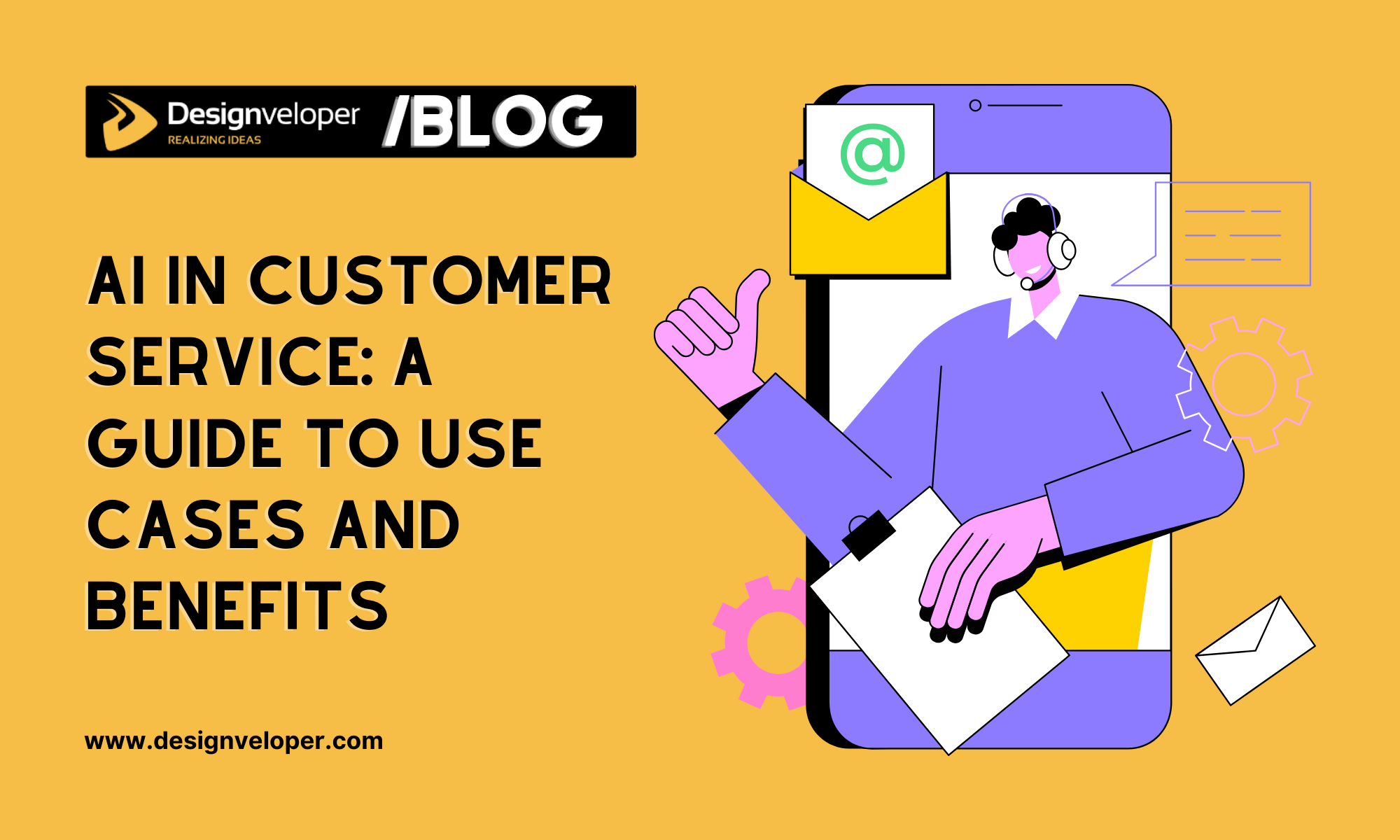
“Hi, I’m the Einstein Assistant. What can I help you with?” You’re not talking to the “real” Einstein or his assistant. In fact, this is an AI-powered chatbot developed by Salesforce to support human agents in customer service. From answering questions and collecting feedback to creating and reporting tickets, the Einstein bot can cover them all.
Like Salesforce, many organizations are starting to use AI tools in customer service. But not everyone understands how powerful these tools can be. So this article is the right place if you’re planning to kickstart your discovery of AI models in customer support. Here, we’ll elaborate on five use cases, benefits, and things to consider before investing in AI-powered customer care. Ready? Keep reading!
First, we’ll learn about AI’s fundamentals, including its role and benefits in customer service:
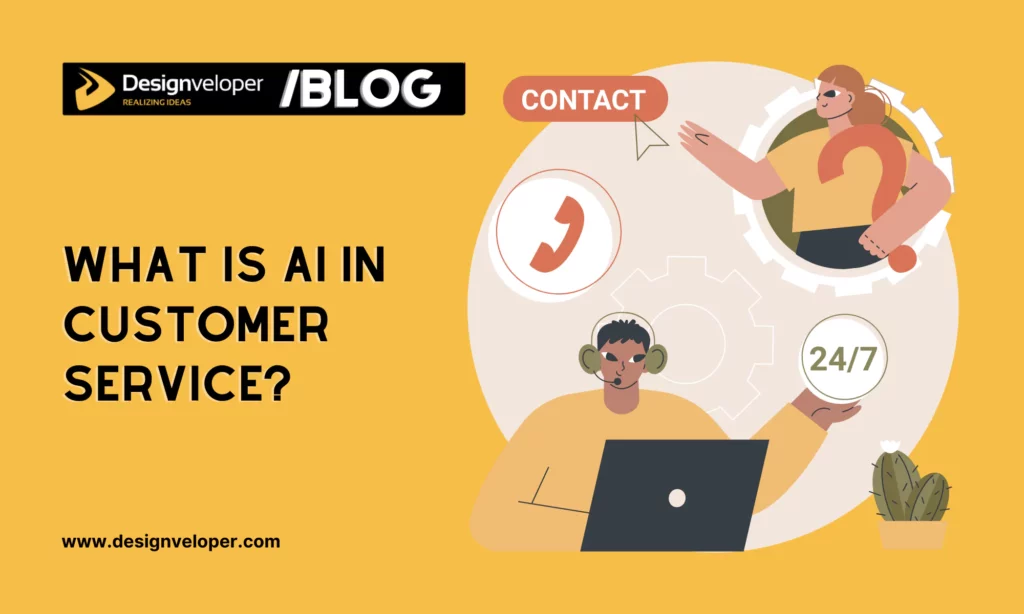
Briefly, AI in customer service means using smart technology to handle customer service tasks like answering common questions or creating call summaries in a second. AI-powered customer support tools now are becoming more intelligent thanks to advancements in machine learning algorithms. These intelligent tools can have engaging conversations with customers, generate content (e.g., reports), recommend personalized offerings, and more.
Salesforce found that 88% of service organizations investing in AI are high performers. Therefore, they’re planning to increase AI investment in upcoming years. This has fuelled the 22% annual growth of AI in CX (Customer Experience) solutions and services from 2024 to 2033.
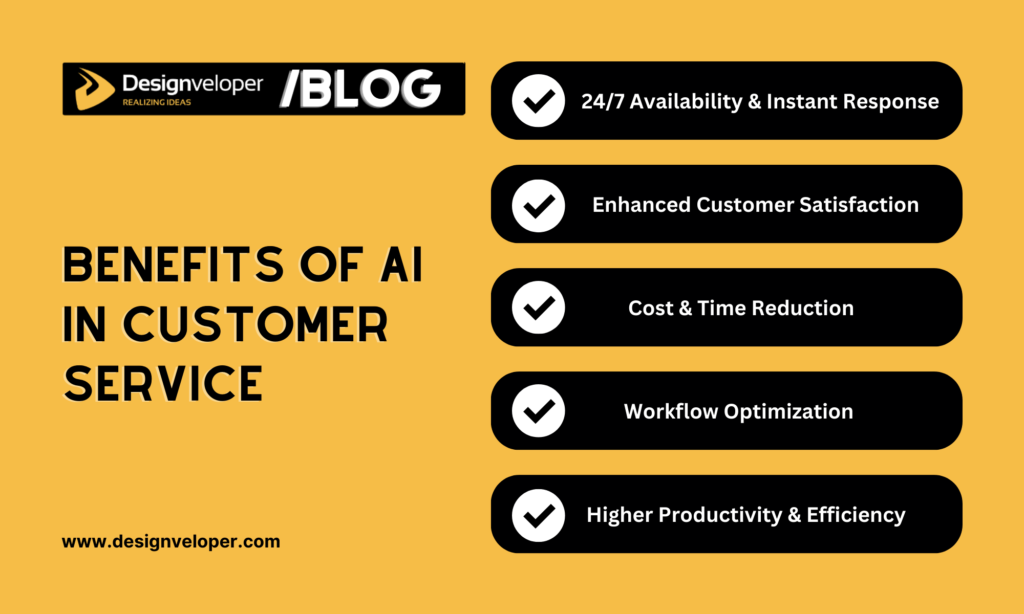
According to the CX Trends 2024 Report by Zendesk, 81% of CX leaders believe that AI will change customer service better. Although they clearly understand this transformation is not easy and AI-related challenges may arise, they still show optimistic attitudes toward this modern technology. Accordingly, they found that AI brings various immense benefits to customer care:
Customers now want faster, more personalized service (78%) and expect companies to adapt to their ever-changing preferences (65%). If companies meet these expectations, customers are more likely to purchase again. This underscores the importance of quality CX interactions to retain and attract customers. However, balancing service speed and quality is a daunting task due to limited staffing and time to respond.
This is where AI comes into play. It can offer 24/7 availability (except for maintenance and upgrade periods). Customers can receive support whenever possible, even during off-hours. AI-powered chatbots can respond promptly and reduce waiting times for answers.
AI delivers faster and more accurate responses. This speed makes customers feel valued as their problems are instantly handled. By offering correct information to a customer’s input, AI can reduce frustration as well.
Even in case AI can’t solve a problem, it can seamlessly transfer the chat to a human agent, along with all the relevant information collected during the conversation. This minimizes response times and boosts customer satisfaction as the customer doesn’t have to repeat themselves.
Over nine out of ten organizations report that AI helps save time and money. Accordingly, they may process a large volume of requests without additional resources as customers may leverage AI-powered chatbots to solve simple or common problems. This allows these organizations to allocate resources more efficiently and frees up service teams on more strategic work. Even when the companies grow, AI models can scale up accordingly. This turns AI into an affordable choice for any business.
AI tools help optimize a service team’s workflows. They can deal with customer-facing issues like responding to services instantly. Further, AI can automate the creation of summaries, reports, and knowledge articles. Several AI-powered systems like Amazon Personalize can deliver tailored recommendations to customers. The assistance of AI makes service workflows more seamless and optimal.
AI tools automate and support repetitive, time-consuming tasks. Typically, around two-thirds of service teams use intelligent scheduling and routing to optimize resource distribution and direct inquiries to the right knowledge article or person. This tech adoption enables them to focus on more complex issues that need creative problem-solving and critical thinking. It also reduces team workload, minimizes human errors, and boosts employee productivity.
You’ve understood what AI means in customer service and how it can benefit service tasks. Now, let’s look through the ten common use cases of adopting AI in this sector:
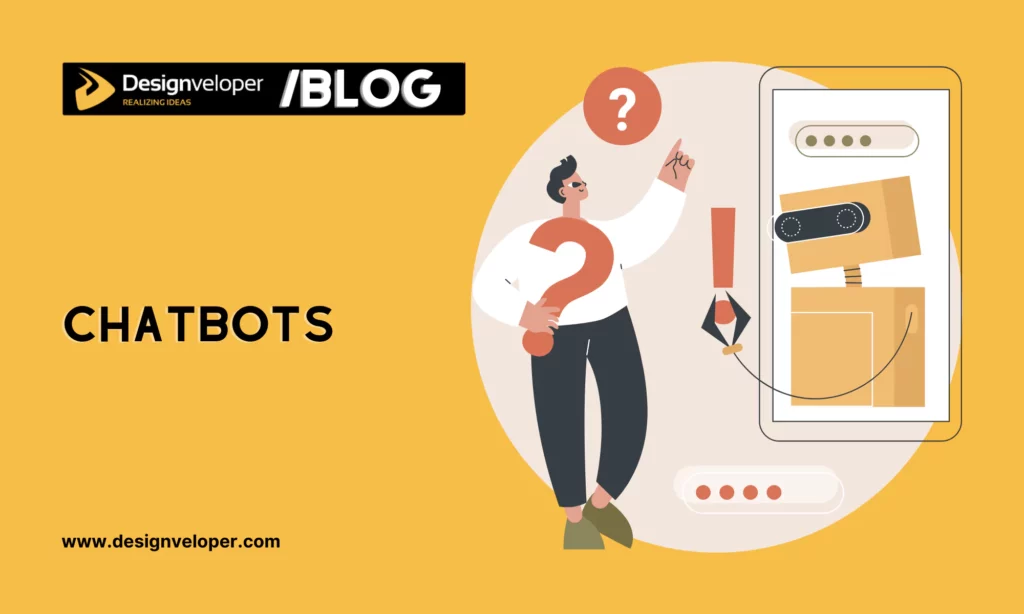
When it comes to AI in customer service, we often think of chatbots. They can mimic human interactions and guide customers through troubleshooting steps 24/7. This gives human agents time on more complex queries while offering timely and accurate support to customers.
Depending on what types of AI-powered chatbots are used, they’ll serve specific tasks:
This is the simplest form of AI chatbot. They depend on pre-programmed rules and keywords to identify the right response based on the user’s query. This means they only perform straightforward tasks like answering FAQs (Frequently Asked Questions) or placing orders.
Sephora Virtual Artist and Domino’s Pizza Order Bot (Dom) are two typical examples of rule-based bots. For example, if a customer asks about “Track Order”, Dom can promptly retrieve information about the customer’s current order (e.g., items ordered and estimated delivery time). It can automatically track and send the order’s status in real-time, for example, “Preparing” or “Delivered”.
This is more advanced than rule-based bots, as ML assistants can learn from data and enhance their performance over time.
These bots use key techniques like natural language processing (NLP) and natural language generation (NLG) to analyze and create natural language content. For this reason, they can process more complex and diverse inputs, hence offering more context-aware and even personalized responses.
Bank of America’s Erica is that type of chatbot. If a customer asks for help to choose a financial product, Erica will tailor product suggestions based on the customer’s financial profile and habits. For example, if the customer has recently bought a new home, Erica can recommend a mortgage refinance or home equity loan.
This combines rule-based, machine learning, and even deep-learning algorithms. These chatbots can use rule-based components for common and simple queries while using ML/DL components for complex and even novel inputs. For this reason, they can offer basic information, personalized recommendations, and engaging content. The Einstein Bot is a hybrid example.
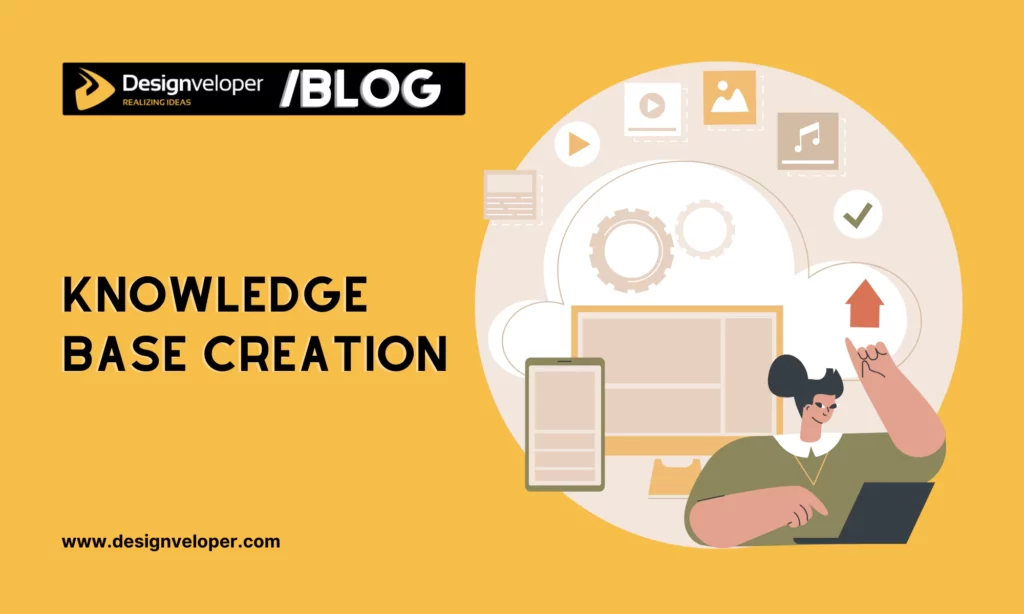
In addition to chatbots, a knowledge base is a popular self-service solution that high-performing organizations are embracing to address an estimated 54% of customer issues. Manually generating and updating knowledge articles might be time-consuming. Therefore, AI appears to automate content generation, organize information effectively, and continuously update the base.
Accordingly, AI algorithms analyze massive datasets from FAQs, customer interactions, and support tickets to discover common problems. They then create step-by-step guides or helpful articles to address these issues.
AI also uses natural language processing to automatically tag and categorize knowledge articles. It can anticipate the best categories for the content and help build logical hierarchies, which makes the whole knowledge base accessible to everyone. AI can even automatically link related articles or recommend personalized content based on a user’s search input.
Various AI-powered systems have the capacity to learn from new data and conversations. So they can determine gaps in the existing base by tracking customer feedback, interaction patterns, or support ticket outcomes. They then can flag these gaps for human review or automatically update the content.

68% of service teams now use AI to automate summary and report generation. Such AI-driven tools as Zendesk, Intercom, or Clarabridge automatically create summaries and distill the key points of customer interactions from call logs, chat transcripts, and emails.
They also help generate detailed performance reports that track KPIs like resolution rates, response times, or customer satisfaction scores. This offers a deep insight into what’s going well and what needs improvements. Also, AI saves customer service agents much time in manually documenting and reporting their work.
Besides performance, AI-generated reports uncover patterns or trends in frequently reported issues or customer behavior. For example, if AI can discover that a certain product needs more support after a software update, it can suggest that customers require more guidance to resolve the problem.
Further, AI can customize reports for different stakeholders or offer real-time alerts when any issue arises. This ensures all people involved receive the right information about service performance and quickly respond to possible issues before they become worse.

In customer service, a ticket is a record of a customer issue or query that a support team needs to resolve. When a customer contacts a customer service agent for help – be it via chat, phone, email, or social media, the conversation will be logged as a ticket in a ticketing system or helpdesk software. AI tools like Freshdesk or Zoho Desk speed up this logging process by understanding and assigning tickets to the right category (e.g., technical support or product inquiry).
In addition, AI can analyze keywords, account types, and customer sentiment to evaluate how urgent a customer’s message is. It accordingly can prioritize tickets for a quick resolution. Similarly, AI-powered systems can intelligently direct tickets to the right department or agent based on the issue’s complexity and the agent’s expertise. For instance, a query about a technical bug might be delivered directly to a product development specialist instead of a general support agent.
The same also applies to emails. Email or ticket automation can greatly reduce resolution times and boost the accuracy of issue handling.

Some AI tools like Skedulo, TimeTrade, or X.ai help automate and optimize appointment scheduling based on different factors (e.g., customer preferences or availability).
For example, if a customer wants to schedule a call with a technical support agent, AI can check whether qualified agents are available and which time zone or language the customer prefers. It then can recommend the best available time slot for both parties and send reminders.
Even when unexpected issues (like agent absences) occur, AI can proactively adjust the schedule in real-time. Particularly, it may reassign tasks or schedule appointments with a callback option. This functionality allows customers to reconnect with the right agent when available, hence mitigating customer wait times.
AI can even route customer inputs, tasks, or support tickets to the right agent or team based on availability, skill sets, or urgency. Intelligent routing ensures that high-priority or urgent calls are routed to experienced agents at the right time. This can boost efficiency, resolution times, and customer experience.
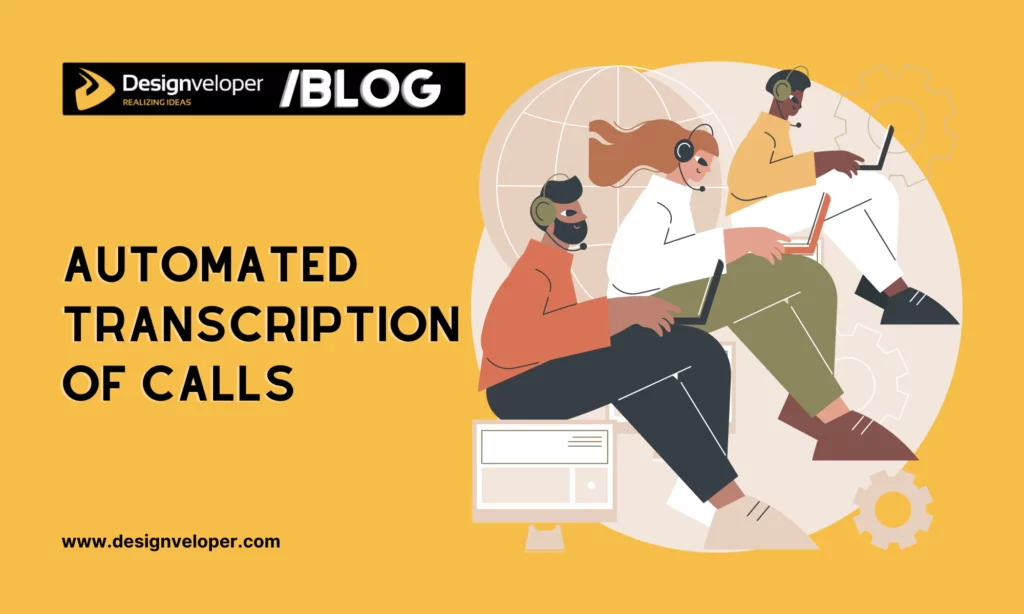
No more manually transcribing your spoken interactions with customers into text. Today, AI-powered tools like Google Cloud Speech-To-Text, Otter.ai, or Rev AI can automatically convert spoken language during phone calls. Using natural language processing and automatic speech recognition (ASR), AI can identify different languages or accents and offer precise transcriptions.
After a call, the entire chat can be automatically transcribed into written text for later review or analysis. These transcripts are even automatically stored in an archive (often called a chat log or conversation log) where service agents can easily search and retrieve these scripts later. Also as mentioned above, AI can recognize and summarize the main points – including important issues discussed or actions taken – from phone conversations.
All these things save much time for manual note-taking and call summarization.

AI-powered sentiment analysis is helpful for service teams to understand the emotions and attitudes of customers during conversations. Using natural language processing, AI tools can analyze a customer’s words or voice tone and detect key emotional cues (e.g., satisfaction or anger).
For example, if a customer speaks in an agitated, raised pitch, AI may flag the sentiment as frustration. Once AI has discovered the sentiment, it can automatically notify agents or recommend real-time corrective action. This enables agents to modify their tone and provide faster resolutions to avoid customer dissatisfaction.
AI-powered sentiment analysis also helps prioritize customer issues based on emotional urgency. Frustrated or negative customers can be escalated for quicker solutions or directed to experienced staff. Further, AI tools with sentiment analysis can automatically produce satisfaction scores based on a customer’s emotions during and after interactions. This helps predict future behavior, improve customer retention, and avoid churn.

Predictive analytics refers to the prediction of possible issues before they arise by analyzing historical data and detecting anomalies. In customer service, data here can involve product usage, interactions, complaints, and support tickets.
When digging into this data, AI can discover patterns that might indicate future problems, predict customer future behavior, or forecast ticket volumes. Service teams then use meaningful insights from this data to take appropriate resolutions to these issues.
For instance, AI notices a pattern of increased customer service tickets during specific times (like a product launch). It then can recommend higher staffing within those periods. This ensures service teams can anticipate which time of the year requires more agents, then allocate resources effectively and prevent delays in customer response.

AI is revolutionizing customer service by tailoring content and product recommendations. Indeed, over half of customers give a rave review of this AI functionality.
AI systems often leverage machine learning algorithms to analyze massive amounts of data (e.g., a customer’s demographic information, past interactions, purchasing history, and browsing behavior) across touchpoints. By understanding these patterns, AI can suggest offerings or content that fit the customer’s needs or preferences.
For example, if a customer often visits the help center for a certain product feature, AI might then recommend knowledge articles for that functionality. AI systems can even suggest an upgrade to a premium service to resolve the customer’s issue better. This helps customer service agents upsell and cross-sell more effectively as personalized recommendations make customers more satisfied and increase their loyalty toward the brand.

Inefficient processes and manual tasks take up a lot of time for service agents. Accordingly, two-thirds of their workday is used for manually entering case notes, internal meetings & training, and mundane administrative tasks. Further, agents have to switch between numerous screens to look for the information they want, which disrupts their work and increases the risk of human errors.
The introduction of AI has positively changed customer service workflows by automating repetitive tasks and freeing up agents for more complex customer interactions. In particular, AI handles routine administrative tasks on behalf of agents, like updating customer profiles, logging interactions, or adding notes to a CRM (Customer Relationship Management) system. AI also keeps data across different platforms synchronized in real-time. This ensures agents always stay updated about customer data without the need to toggle between screens.
AI can support internal processes, like scheduling, creating internal reports, or setting reminders for follow-ups. This allows CX leaders to track the progress and ensure that crucial or prioritized tasks will be completed on time. Besides, handling customer issues frequently requires collaboration between different departments. AI helps connect all departments involved and ensure they’ll receive the task at the right time. This reduces manual handoffs that might cause delays.
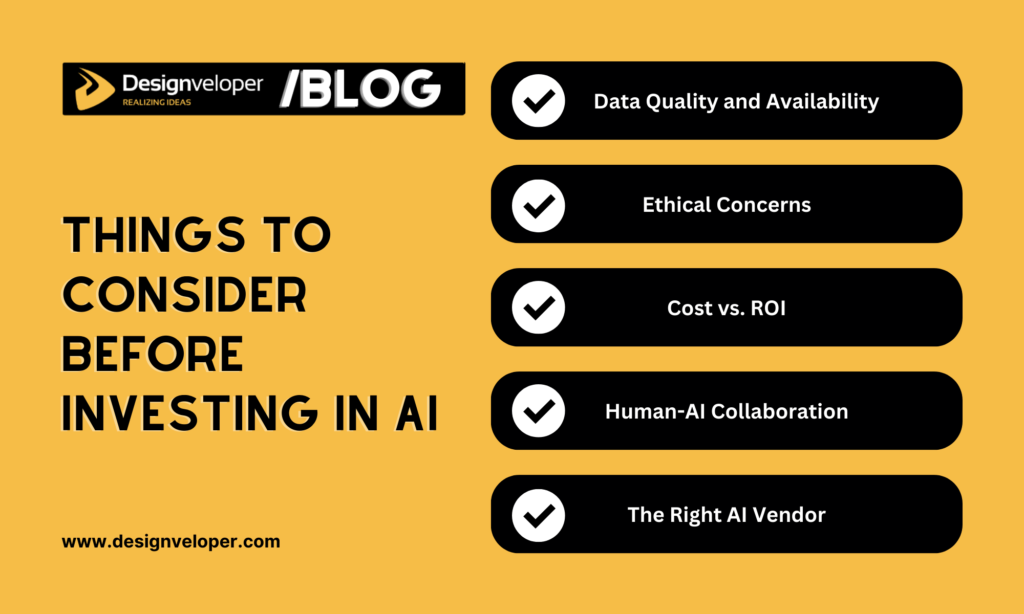
AI has various applications in customer service and comes with potential benefits. Yet, AI investment requires careful consideration if you don’t want to encounter unexpected setbacks. Here are things you should learn about before deciding to pour money into AI-powered customer support:
AI systems require high-quality data for training to make accurate outcomes – whether predictions, recommendations, or workflow automation. Poor data might cause ineffective or misleading responses.
However, only 40% of service agents are completely confident in data accuracy. Not all customer data is available and has good quality for some reasons. This might involve biases, lack of data integration, incomplete data collection, data privacy restrictions, and more.
To avoid these data problems, your service teams should ensure that AI chatbots would collect real-time data from all interaction points, such as chat, email, or social media. It’s also crucial to integrate data from different sources (CRM, marketing, or helpdesk) as this allows AI models to generate complete insights for informed decision-making.
In addition, store all collected data in well-organized, centralized platforms. This allows AI systems to access all the essential, up-to-date information without delays or fragmentation. Finally, devise data management strategies that focus on standardizing, cleaning, and properly labeling data. These tactics help AI systems better understand the context and intent behind the data and make accurate outcomes.
As AI becomes increasingly adopted in customer service, some ethical issues accordingly arise. They mainly revolve around privacy, security, and accountability.
We all know that AI models often require vast customer databases – including personal details, interaction logs, and purchase history – to operate effectively. However, this raises concerns about how this data is collected, stored, and used. Indeed, 70% of customers refuse to buy a product or use a service from a company that lacks the ability to safeguard their data. Further, they feel frustrated and distrustful of those who lack transparency in AI decisions and usage.
Therefore, a whopping 83% of CX leaders prioritize data privacy and cybersecurity in their customer service strategies. Here are some practices you might leverage to address ethical issues:
AI models seem to be a cost-saving solution in customer service when you count their long-term benefits. However, initial investments in AI might be costly as they often require upfront expenses for software, integration, and employee training. AI investments may also cover ongoing maintenance, data management, and even additional recruitment of AI specialists. Therefore, when considering AI for customer support, you should measure the costs against the possible return on investment (ROI).
But in fact, quantifying ROI for AI investment is not that easy – or we have to say, impossible. It’s because the success of AI models relies largely on data quality, customer loyalty, and other intangible benefits. So, you should look at other key performance indicators (KPIs) to evaluate the effectiveness of AI investment. They include operational efficiency, customer satisfaction metrics, and AI’s adaptability to market shifts.
As we already mentioned, AI requires a high-quality, accurate dataset to produce trustworthy content. However, there’s nothing to ensure that your databases or AI-generated outcomes can always meet this requirement. This is where human management comes into play.
Customer service agents must be encouraged to review every service interaction to see whether AI can answer a customer’s request accurately. For example, when a customer asks about a particular product feature, verify if a bot sends the relevant knowledge article to resolve the query. Human agents, on the other hand, need to regularly review AI-produced content – be it a report, summary, or knowledge base.
Obviously, to help human agents use their full potential, it’s crucial to provide employees with intensive training. Your team should understand how to use AI tools effectively while maintaining the personal touch in customer interactions. A strong collaboration between human agents and AI helps your company work smoothly, enhance the whole team’s performance, and improve customer experience.
Whether you’re planning to use third-party AI tools or outsource AI development, choosing the right AI vendor is crucial. Not all vendors provide the same solutions, so you should look for one that meets your business needs. Start with those with a proven track record in customer service AI. It’s important to check their technical expertise, experience, and how they’ve helped clients in your specific industry.
Further, make sure the vendor’s AI tools come with all the features you need and integrate with your existing software (e.g., helpdesk or CRM). Consider if the vendor offers ongoing maintenance and updates as this will ensure AI tools function seamlessly as expected.
Don’t ignore AI transparency by asking the vendor how their AI systems make decisions and how they process customer data. Additionally, ensure that the AI systems offer robust security functionalities, allow customization, and adhere to industry regulations.
While price shouldn’t be the only deciding factor, you should ensure the vendor’s services are within your budget. Find the right balance between cost and quality to get the best value for your investment.

At Designveloper, we understand AI will empower the future of customer service. We support clients in crafting scalable AI tools that streamline their operations and improve customer experiences. Our team has extensive expertise in customizing AI solutions to fit your specific business requirements, be it enhancing customer interactions or automating repetitive tasks. Here’s what we offer:
We also offer ongoing support and updates after deployment. Therefore, you can count on us as your long-term partner when your AI demands evolve. Trusting Designveloper means working with a team that values personalized service and innovation. We’ll guide you through the AI journey and help your company thrive in customer service. Contact us now!





